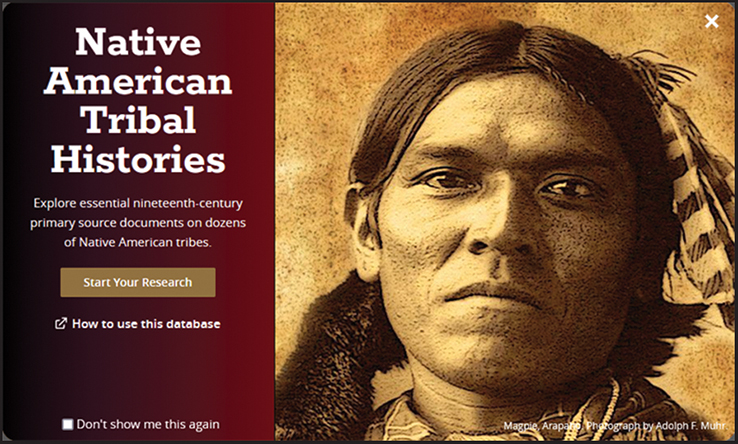Native American Tribal Histories: Series 1–4, 1813–1880 | eReview
This extensive database of previously unaggregated primary-source documents provides a view of the United States government’s documentation of a crucial period in U.S. and Indigenous history. A valuable resource for researchers seeking firsthand reports in U.S. political and military history.
Native American Tribal Histories: Series 1–4, 1813–1880
CONTENT In 1806, the U.S. Congress created a superintendent of Indian trade within the War Department to monitor and control trade between the U.S. and Indigenous nations. In 1824, the Bureau of Indian Affairs (BIA) superseded the previous department. Readex’s Native American Tribal Histories collection, curated by the National Archives and Records Administration (NARA), offers researchers access to U.S. government documents spanning 1813 to 1880, which describe education, land rights, treaty negotiations, commerce, and other affairs overseen by U.S. regional superintendents and their agents. The documents memorialize a time during which settlers were moving further west, and Indigenous peoples were being displaced and confined to progressively smaller parcels of land and losing tribal autonomy. While the database contains missives from English-speaking tribal members, most materials reflect BIA officials’ involvement with Indigenous nations and representatives.
This recently completed database includes 1,038 tribe names, 172 agencies, 407 treaties, and 2,655 names—at least 1,000 of which belong to Indigenous peoples previously undocumented online. The 23 superintendencies include Arizona, Arkansas, California, Central, Colorado, Dakota, Florida, Idaho, Iowa, Michigan, Minnesota, Montana, Nevada, New Mexico, “Northern,” Oregon, “Southern,” St. Louis, Utah, Washington, “Western,” Wisconsin, and Wyoming. Documents comprise letters and telegrams to and from superintendents, agents, and the commissioner of the Bureau; communications from tribal leaders; annual reports of superintendencies; treaties and negotiations; registries of letters; and detailed historical background notes created by the curators of the National Archives. Central themes include the displacement and forced relocation of Indigenous peoples; land allotments, annuities, and other payments to Indigenous peoples; intrusions on Indigenous lands and depredation claims; enforcement of federal laws and regulations; and military conflicts and alliances between Indigenous nations and the United States.
USABILITY The landing page is straightforward, with links at the top supplying an overview of the site contents and detailed information on conducting and modifying searches, using facets, and working with image content. This informational section also provides an excellent description of the limits and advantages of optical character recognition.
The search bar at the top of the main page defaults to a basic keyword search. Researchers can also refine searches by tribe name, decade, year, place or region, superintendency, agency, treaty, topic, event, person, fort/company/mine, author, publication category, NARA roll number, and database. A search narrowed by one or more limiters returns results with details such as title, author, primary tribe(s), tribe variant name(s), superintendency, agency, publication category, document type, physical description, and NARA details.
Once a result is selected, the document appears as a series of images of the handwritten original. Beyond simply reading the document, researchers can generate citations, download documents, print, or send the document by email.
PRICING Pricing is available for a range of purchase models and is based on multiple factors, including institution size, enrollments in the relevant disciplines, and level of research orientation. Consortial pricing is available. Librarians can contact their Readex sales representative for pricing by calling 800-762-8182 or emailing sales@readex.com.
VERDICT This extensive database of previously unaggregated primary-source documents provides a view of the United States government’s documentation of a crucial period in U.S. and Indigenous history. A valuable resource for researchers seeking firsthand reports in U.S. political and military history.
RELATED
ALREADY A SUBSCRIBER? LOG IN
We are currently offering this content for free. Sign up now to activate your personal profile, where you can save articles for future viewing










Add Comment :-
Comment Policy:
Comment should not be empty !!!